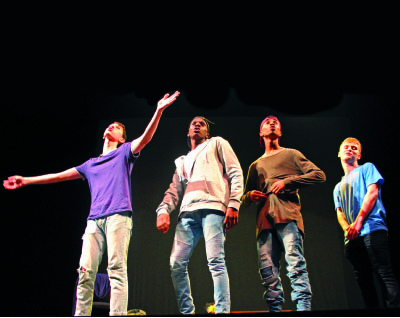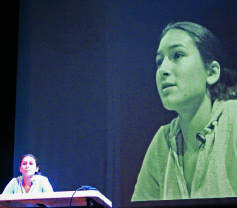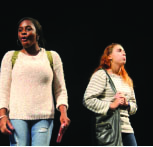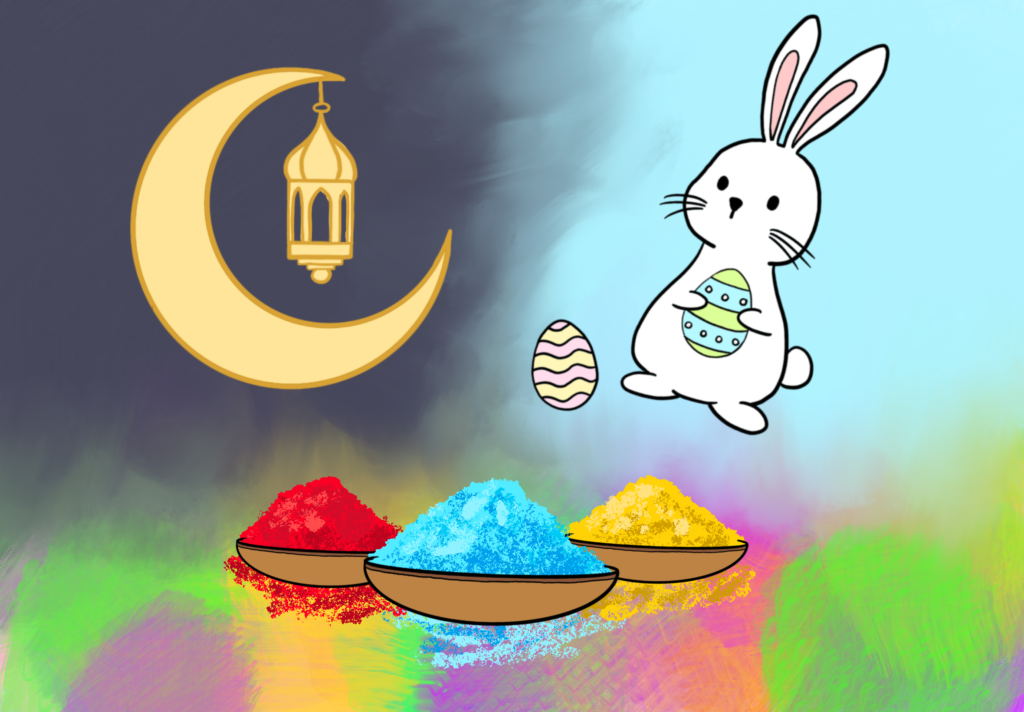SLUT: The Play and Now That We’re Men: A New Play, written by Katie Cappiello and featuring teenage actors from The Arts Effect of New York City, brought the audience to tears on September 27. SLUT included only female actors while Now That We’re Men included only male actors, each portraying serious messages regarding rape culture and consent in high school.
“This is just important content and important material to share and to share in this powerful. To me it is so different from bringing in a speaker, another adult, to talk about sex. This is teenagers talking to teenagers, and that just makes so much more sense,” Ms. Kalya Yannatos, the Head of the Arts Department, remarked.

(From left to right) Jordan Eliot, Alphonso Jones, Caleb Grandoit, and Fred Hechinger performing in Katie Cappiello’s Now That We’re Men.
“Even if people don’t feel the plays are relevant to them right now, at some stage in their life, there’s a high likelihood they’ll become relevant. The point wasn’t to have plays that were perfectly relevant. The point was to bring something on campus that would get people talking about this,” Dean of Students Mr. James Stanley commented. “It’s taken a really challenging topic out of the shadows and has made it a campus-wide conversation. That to me is what’s important.”
Ms. Yannatos had the idea to bring the plays to Choate after hearing about them last December from an alumnus during Choate’s 125th anniversary. She, Mr. Stanley, and Mrs. Kathleen Wallace, the Associate Headmaster, joined her to watch SLUT. Ms. Yannatos also saw Now That We’re Men.
On stopslut.org, the website for both of these plays, Ms. Cappiello explains the goals for Now That We’re Men and Slut. “The goal with this project is to tell the truth. We can’t move forward if we aren’t brutally honest about where we are and where boys are right now,” said Ms. Cappiello. And with regards to the movement of spreading awareness about consent, she added, “StopSlut uses this powerful play to ignite social change. The movement supports a youth-initiated response to slut shaming and sexual assault, addresses the inaction of bystanders, the need for sex education that examines dynamics alongside mechanics, and emphasizes the responsibility we all share in perpetuating misogyny through our language, actions and inactions.”

Joey Del Marco, the protagonist of SLUT, endured intense interrogation in which she recounted her sexual assault.
The plays not only highlight the realities of slut and rape culture, but also address a variety of other issues, such as masculinity and societal perceptions of male and female sexuality. There were two performances of plays on Friday; in each session Now That We’re Men performed first, following five teenage boys and their experiences with masculinity, sexual assault, homophobia, and more. The play was then followed by SLUT, which details the sexual assault of sixteen-year-old Joanna (Joey) Del Marco and the events that follow.
Members of the Choate community have reacted differently to the productions. Ms. Yannatos said, “The plays themselves are pretty jarring. They cut through to the core and make you feel and make you think in ways that are just so critical and so important as a culture, as a community especially and how we care about each other and how we think about challenging topics and how we talk about them or don’t talk about them.”
English teacher Mr. Edward McCatty had a similar opinion. Addressing the plays’ importance, he said, “Even though the topics are troubling, and the way they were presented was disturbing to many, the underlying ideas are important.” These concepts include how boys talk about girls and how a group mentality affects the thinking of an individual. “I hope that these plays reminded students how important it is to be courageous when it’s necessary and to not let themselves take those actions that could be harmful to others even when they might not think they are acting inappropriately. Even when people are caught up in the energy of a group, I hope they are able to know their own thoughts and values and stand up for how they hope people are treated.”
Cammi Chester ’17, one of the students who facilitated the mandatory conversations after Friday’s plays, also expressed her enthusiasm for the plays’ content and message. Chester said that the plays were important for the community to watch because they provided a raw depiction of rape and hookup culture in teenagers’ lives. “There was no sugarcoating or filtering what is said behind closed doors, away from adults, which furthered the connection to the audience, and it was easy to see parallels with Choate students.” She also liked that each play was performed by either male teenagers or female teenagers only, because they showed how both boys and girls are involved in the rape culture of teenagers. According to Chester, the plays did a good job of showing how girls victimize other girls with regards to “he said-she said” arguments, and how peers and social media influence those arguments.

SLUT portrayed high school relationships and struggles, speaking to the social pressure faced by many female adolescents.
She continued, “I think people took the conversations very seriously and made it clear that they really want to see a change at Choate.” She did note that some students did not think that the plays were worth the time they took out of their lives and that rape culture is not prevalent at Choate.
Although some members of the community praised the plays, others viewed them with more criticism. Jun Jang ’17 commented “I found Now That We’re Men heavily biased, and it could have been more comprehensive.” He added that the girls’ play conveyed the idea that in the case of a rape trial, “the image of a person, whatever it is, should be discarded, and the actions the girl had taken prior to the unfortunate rape incident are meaningless.” He said that though rape is never okay, SLUT downplayed the social status Joey had been building up as a member of the Slut Squad, a promiscuous school dance team, and the fact that the boys who assaulted her were drunk. Other students argued that being under the influence of alcohol did not justify violence or sexual assault.
Stella Fitzgerald, who plays Jane in SLUT, said, “When boys see this play, they don’t want to associate themselves with the rapists in the play. It’s important to understand rapists aren’t just the guys in the alley who jump out at you, but a lot of women and men are raped by people who they know, like acquaintances or friends. The guys who rape the girl in this play are her best friends.”
In addition, Fitzgerald commented on the effectiveness of the plays as opposed to a traditional speech or presentation. “I think having a visual is so much more helpful for students for understanding what rape culture is as opposed to having someone speak in health class.”
Mr. Stanley reflected, “I think consent and rape culture is a national conversation. It’s something that’s being talked about at college, that’s being talked about at peer schools. It’s coming out of the shadows, and I think it’s the responsible thing for Choate to do to engage students in conversation so that they understand why consent is important, understand the complexity of personal relationships. I think that’s something the plays did well. The characters were very nuanced. It is possible for people to make bad decisions because they don’t understand. It’s better for the school to help people understand before they make bad decisions.”


